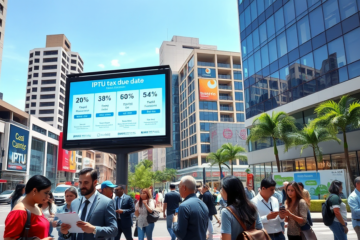Operation Hidden Carbon Dismantles Billion-Dollar Scheme
Tax evasion has been a recurring theme in Brazil, especially in the fuel sector.
In this article, we will explore Operation Hidden Carbon, launched on August 28, 2025, which aims to dismantle a billion-dollar tax evasion scheme associated with the PCC faction.
With approximately 1,400 agents involved, the operation not only seeks to arrest those responsible, but also to recover significant tax losses that affect the entire economy and the lives of consumers.
We will analyze the financial impacts, fraud, and irregular imports of methanol, highlighting the gravity of the situation.
Context and Launch of the Operation
The outbreak of Operation Hidden Carbon in August 28, 2025 brought to light the gravity of the billion-dollar tax evasion scheme that has ravaged the fuel sector in Brazil.
This scheme, articulated by the faction PCC (First Capital Command), caused a significant impact on the tax system, evading approximately R$7.6 billion in taxes.
The criminal conspiracy not only harmed the public treasury but also destabilized the economic chain, reaching consumers with adulterated fuels, compromising the quality and safety of the product offered.
With the significant participation of the PCC, which uses these illicit means to finance its operations, the operation became essential to dismantle this group's infiltration into the economic sector.
According to analysis of the fuel sector, combating these crimes translates into consumer protection and the appreciation of reputable companies.
Police Mobilization and Interstate Outreach
Operation Hidden Carbon mobilized approximately 1,400 agents from various security forces to dismantle a complex tax evasion scheme in the fuel sector.
More than 350 search, seizure and arrest warrants were executed in several Brazilian states, demonstrating the extent of the interstate reach of the action.
This robust logistics reflects the gravity of the crime under investigation and the need for a coordinated response among authorities.
Interstate Task Force
A integration of security forces and tax agencies Operation Hidden Carbon demonstrates the strong cooperation between various institutions to combat tax evasion in the fuel sector.
With the participation of Federal Revenue, State Finance Departments, Federal and State Police, the task force acts in a coordinated manner, sharing information and resources.
This coordinated action increases the effectiveness of investigations and asset freezes, helping to dismantle illicit schemes and recover tax losses.
Interstate and federal cooperation becomes essential to face such a complex and comprehensive scheme led by the PCC in the fuel sector.
Compliance with Warrants
The teams responsible for executing the search, seizure and arrest warrants in Operation Hidden Carbon they acted in a coordinated and strategic manner.
With the support of about 1,400 agents, the greetings covered several cities and states in Brazil.
The operation began with the precise identification of the targets, which included both individuals and legal entities.
Careful planning was essential to ensure that the warrants were executed effectively and safely, ensuring the safety of those involved and preserving potential evidence.
Node day of operations, the teams moved to the previously tracked locations, considering the logistics and particularities of each target.
The execution of the warrants followed a clear sequence of actions:
- Tracking: identifying exact locations and verifying security conditions
- Execution: Safe and meticulous approach to targeted properties
.
During the operation, agents ensured that the process was recorded for future investigations and for the transparency of procedures.
The teams' rapid response was crucial, preventing adverse actions by those involved and enhancing the operation's effectiveness.
Tax Evasion Scheme and Economic Impact
A Operation Hidden Carbon revealed a billion-dollar tax evasion scheme that directly impacts the Brazilian economy, involving the First Capital Command and 1,000 gas stations.
This scheme resulted in a tax evasion of R$7.6 billion in taxes, in addition to a movement of R$ 52 billion between 2020 and 2024. Those involved used irregular methanol import practices and threats to owners, harming everyone from consumers to the entire economic chain.
The consequences of this scheme are vast.
The following table summarizes the values involved:
| Category | Value |
|---|---|
| Hidden Values | R$ 7.6 billion |
| Capital Movement | R$ 52 billion |
| Estimated Loss to the Treasury | Significant |
This negative impact on the treasury directly affects the government's ability to invest in infrastructure and public services.
Furthermore, the adulteration of fuels through the addition of illegally imported methanol undermines consumer confidence and the quality of the final product, creating a cycle of continuous and complex economic loss.
Fuel Adulteration with Methanol
The use of *methanol*, a substance imported irregularly, stands out among the adulteration strategies in the recent scandal investigated by Operation Hidden Carbon.
Irregular importation by Port of Paranaguá allowed this substance to be widely used at the gas stations investigated.
The practice involves significant risks to fuel quality and, consequently, to consumer safety.
Frauds like these not only compromise consumer safety, as methanol reduces engine performance while increasing the risk of damage., but they also destroy the integrity of the supply chain by creating an unfair market.
Furthermore, such tampering can lead to severe penalties for all involved in the scheme, reaffirming the importance of joint operations to inhibit this type of large-scale organized crime.
Coercion of Owners and Recovery of Assets
In Operation Hidden Carbon, a series of threats were made to gas station owners, aiming to prevent them from charging the correct sales prices.
Members of the PCC (First Capital Command) infiltrated the entire fuel production sector, as indicated in a report from UOL, and used extortion and death threats to silence the owners of the establishments.
These owners, often forced to sell their businesses under duress, did not receive the proceeds of the transaction and were subjected to constant fear of reprisals.
In response to this alarming situation, the courts implemented asset freezing strategies with the aim of recovering the large amounts of taxes evaded by the criminal organization.
The court's freezing decision targets assets that could compensate for the colossal losses to the public treasury., seeking to ensure that the amounts retained help mitigate the tax shortfall caused by years of illegal practices.
The measure reflects the judicial system's attempt to effectively tackle tax evasion and restore fiscal justice in the fuel sector, punishing those involved and restoring public trust in institutions.
Operation Hidden Carbon illustrates the challenges faced by Brazil in combating tax evasion.
With strong action, we hope to restore the integrity of the fuel sector and protect consumer rights, reinforcing the importance of fighting impunity and tax crime.



0 Comments